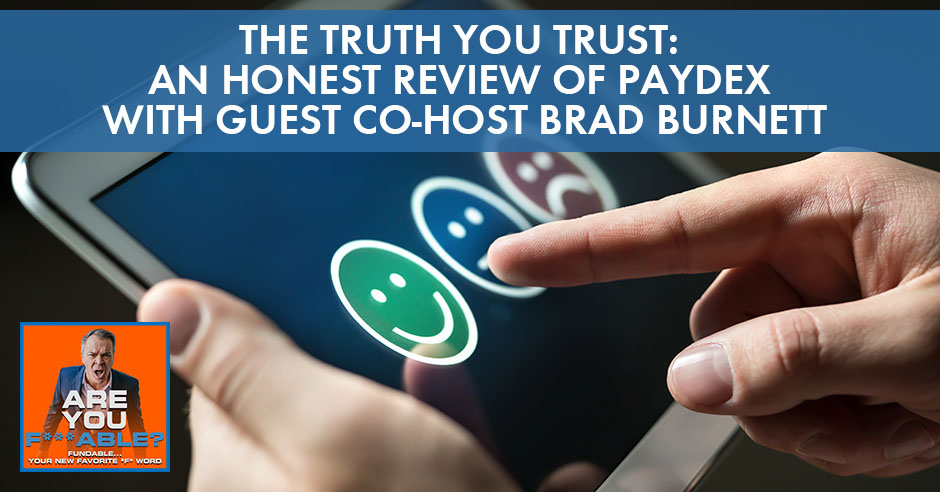
It’s hard to imagine that many are losing opportunities simply because they are being cheated by a scoring system. This is how others are going through with Dun and Bradstreet’s Paydex. In this episode, Merrill Chandler and Brad Burnett talk about the evils of the Paydex score and what it is all about. As they take us into their little trip to FICO that revealed multiple things they weren’t aware of, they also explain the tiers of building your credit and share the different types of credit instruments that can help you grow your entrepreneurial enterprise.
—
Watch the episode here:
Listen to the podcast here:
The Truth You Trust: An Honest Review of Paydex with Guest Co-Host Brad Burnett
In this episode, we’re going to be talking about the evils of the Paydex score. What is Paydex? What is that all about? Why do we call it the evils of Paydex, especially since our little trip to FICO and now the things that we know that I wasn’t even aware of?
It’s the Dun & Bradstreet Paydex score. We laughingly and jokingly say the evils of Paydex because it’s a dinosaur. It’s the archaic system that is evilly still being used and promoted by a lot of companies. It’s the early modeling of business scoring. The only thing it scores is do you pay your bills on time.
Any bills, not credit accounts, creditors like the tier one, tier two, even tier three banks like community banks that have a business credit cards, credit lines and things like that, they don’t report to Paydex. Let’s go back in time what Paydex was and have you recognized where this all came from? In the ‘70s and ‘80s, Dun & Bradstreet had been collecting business data until then even a few years. The business data became more of a self-reporting process. Their big pitch out in the world was, “Have your business be represented so that other businesses can check you out. The way you do that is that you rat yourself out. Pay us anywhere between $5,000 to $1,500 and you give us a list of the people who you use like your cell phone bill, water bill, merchant accounts, all that stuff.
If you’re a plumber, you go to the plumbing supply store. You’re going to have the plumbing supply store.
Real estate investors would be like your carpet suppliers. Those are all vendor trade lines. You would then put all those on a list. You would send it to your rep at Paydex. They would call them once and say, “Does CreditSense pay this bill on time?” The person would say, “Yes, they do.” Someone’s going to turn in an app or turn in a creditor or a vendor who they don’t pay on time. The reason why it’s not trustworthy is it’s not objective. The business owner who’s looking to get reported positively so other lenders or vendors can look them up. You’re reporting yourself.
“Does CreditSense pay this bill on time?” “Yes, they do,” and they’d go down this list. There were packages that had six, twelve and even eighteen creditors. Most of it were all trades and your cell phone bills, all those things. We say this all the time and you’re going to hear 100 other times, but we talk about is Chase business going to give you a $50,000 business line of credit, even a $50,000 business credit card on your carpet vendor payment history? It’s not going to happen. This whole structure was Dun & Bradstreet’s way. They created their own blue ocean and created a market for themselves. They fulfilled a need, “You need a business reputation,” and then it began to promulgate or evolve from there. The problem is it became institutionalized as it evolved. You do anything and stay in the market for many years, all of a sudden it becomes a name. They did have a reputation for collecting business data. They would go to Chambers of Commerce and other locations to find more businesses to say, “We have 60,000 businesses. We have 220,000 businesses.”
As they were doing that, those businesses started reporting directly to them.
They were not the tier one, two and three banks. They began to build relationships like Uline credit. You get their catalogs. I’ve called them how many times to stop wasting all of those trees on me. Uline catalogs, Federal Express accounts.
There’s a real reason that’s not diabolical but is completely a waste of time on why Uline keeps popping up and why you will continue to get any type of publication or their catalog from them.
Every version of my PCID, I keep deleting myself and calling that catalog company up and I still keep getting them. The bottom line is Dun & Bradstreet had become institutionalized, so much so that when we were back at FICO World ‘16, we went and met with the reps for them.
Paydex is not trustworthy because it is not objective #GetFundable Share on XWe went and met with the Dun & Bradstreet reps because this FICO rep said, “Please go and talk to these guys and tell them they need to jump light years ahead with the small business scoring system.”
The whole point of the Paydex was a scoring system. We’re not as much bashing on Experian business because they just take some metrics and give you a score, but the score is relatively worthless. No tier one through three lenders use these business scores in a decisioning process.
Just so we’re clear, there’s Experian Small Business, there’s Equifax Small Business and Dun & Bradstreet who all report business credit, but it’s evolving. The conversation was business credit now is where personal credit was in mid-‘80s. It’s the Wild West.
What this episode is especially focused on is how many individuals that you know, friends, family or associates in your real estate circles, in your business circles, all the entrepreneurs out there are looking for business credit. The only people marketing out there are people who are saying, “We’ll build you a Paydex score because you can get approved for these Paydex scores.” I’m going to have Brad walk us through the tiers. There are five or seven tiers.
I’m not going to pull any punches. Usually, I do not give the names. Now we’re naming names because the biggest company out there promoting this “Build your business credit,” they don’t say, “I’m going to build your Paydex.” They say, “We’re going to build your business credit and we’re going to get you in a position where you can be non-recourse.”
It’s non-recourse where it’s only on your business and you’re personally guaranteeing it. The same thing for these guys is that when you subscribe to their service, they go through this relentlessly tiresome process that ultimately doesn’t end up in corporate credit that they promise.
Not only are they being a little bit deceiving, but this is also where some of the evil comes in. They’re going to tell you, “We’re going to build your business credit.” They leave out the type of business credit. It’s going to be an eighteen-month process. The biggest company out there is called Credit Suite. I was on the phone with one of the VPs of Credit Suite a couple of years ago. He was pushing hard to have us come in and start repping their product because of what we do.
As we went through the conversation, I was holding back the one question that I knew was going to be the question that would sink his ship. He was feeling pretty good about things, “We can absolutely go non-recourse. We can get them in a position where they get credit only in the name of the business.” I said, “You’re telling me at the end of your eighteen-month process, my clients can go out and get an unsecured business credit line in just the name of their business?” Without even a hesitation he said, “They could probably get a business credit card, like a cash card. They’re never going to get a business line of credit. Post-2008, they’re going to have to put their name on the line.” I was like, “I knew that, but I wanted to confirm that you’re on the same page.”
The thing is the non-recourse, we verify every 90 days to make sure programs are still in play, etc. They might send you to a Capital One Spark card that they say is on your business, but it’s not. They may send you to a Chase Ink or one of the American Express cards. Depending on where their program is, maybe only on your business, some are on your personal. Here’s the fascinating thing, even American Express must be personally guaranteed because they don’t trust the business data reporting.
Let’s take them back to how we get to that point even. To build your credit, here’s how we build this. It all goes back to the Paydex system. The first thing we need to do is we’re going to open up three merchant accounts. These merchant accounts are merchants that will report to Dun & Bradstreet. Uline every single time comes up. We’re a business. We have employees. We don’t even need a Uline account because we do not bring in that much supplies. Imagine being just you and I was sold this bill of goods a few years ago and didn’t know any better because that was still the thing.

Truth About Paydex: The whole point of the Paydex was a scoring system.
We hadn’t moved into business yet.
As a single individual running my little consulting company, how do you want an account? They’re like, “You have to have positive reporting every single month for six months,” which means I have to buy supplies, traffic every month for six months. I had paper towels stacked. I had no need for this stuff. It was like being a single person going to Costco and buying all the bulk stuff. It’s the same concept, but you had to do it with three different accounts and they had to all report positively for six months. After that six months, then you could move to the second tier, which would be like an Office Depot or an OfficeMax. It’ll be a card like that. It’s not even their cash card. It’s their store credit card.
You can’t go out and go shopping, get gas or go to the movies and get points towards that card. Gas cards are third tier.
Gas cards are coming at the high end of the second tier into the third tier, but straight up gas cards. You have those corporate accounts.
They have fleet. You have to establish a fleet. We’re doing this for memory, even though we keep tabs on all the people out there who are not doing right by borrowers. If you want a Dun & Bradstreet Paydex score that’s above 80, which is good, that’s a B or higher, then use whoever says they can do it. That’s not what we’re after.
That’s the other thing. 80 Paydex score was the good score. If you had an 80, we could get you credit. The 80 means you paid on time. If you want it to go to 90, pay it early twice and that’s the magic. That’s how complex the system is. It’s not algorithmic scoring at all. After you go with the fleet and then you can get your gas cards and do those things, each of these phases is six months. At the end of eighteen months, you could be in a position to go into the next phase, which is where you might be able to get a business credit card that you can go use for any purchase in just the name of the business. The crazy thing is most of those creditors post-2008, they require a personal guarantor. It has nothing to do with Paydex or your reputation with Paydex.
You have to personally guarantee. We’ll cover why all of this occurs and why FICO is doing this differently. The bottom line is getting a good Paydex score, we’re not dissing on anybody who says, “I can get you a good Paydex score.” I’m saying is what do you want? Do you want a $20,000, $30,000, $50,000 business credit card? Do you want a $20,000, $30,000, $50,000 business credit line, write a check and do a deal?
Like the $75,000 you got. $10,000 card and $65,000 credit line that you can go, “I’m going to give you this check to do this deal.”
$50,000, exactly. The bottom line is for us, we’re not talking Paydex. We’re talking what type of credit instruments are going to grow your business, grow your entrepreneurial enterprises. What is it that you’re trying to go after? Where the money is, how to get there depends on where you are. If you want a Paydex score and we call that Muskogee, Wisconsin, then there’s a road to get you there. There is eighteen months’ worth of directions to get you there. If you’re headed for New York City where the business lines of credit, the true commercial lines reside, that’s a different trip and Paydex is not anywhere near that. There is not a single, large tier one or tier two bank. There may be a few community banks and a few local credit unions that may refer to Paydex, but nobody’s giving approval authority from Paydex scores. It’s an amalgamation or a mix of your personal profile, your credit score, and an SBSS FICO. FICO then pings these bureaus to check your data, not your payment history. They’re checking your data points to make sure who they’re truly lending to.
To bring up a point that we’ve talked about in past episodes, 80% of your business funding approval is based on your personal profile. Your borrower profile is the key. Unless your business is doing tens of millions a year and you’ve got your S&P score, Standard & Poor’s.
80% of your business funding approval is based on your personal profile #GetFundable Share on XThe last thing I wanted to say about the marketers, the Credit Suites of the world, they call it corporate credit. They’re using language to deceive. There’s small business credit. Every bank, if you’re a corporate credit client, you have an S&P credit score. You’re in the Standard & Poor’s grading. You don’t even have to be a stock company or traded on any of the indexes, but you have to be a player. Those are corporate clients. They’re not small business clients. You and I, we do well. We’re a small business client. When any of these outfits refer to the term corporate credit, if you see corporate credit on a brochure, you’re being lied to in your face. Corporate credit is a high-level, $5 million credit lines, $50 million credit line.
That is not the game we play. If you want to get a Standard & Poor’s index and you’re reading this and you do have the revenues and the ability to do that, come and talk to us because that’s rarefied air. That’s the fun stuff to play in. Our coaching, our students and our clients, we’re all small business owners, we’re entrepreneurs. $1 million credit line would do most of us for the rest of our lives because we know how to play that game in real estate, growing our businesses, buying and selling note, whatever it is that you’re doing. $500,000 is going to be a game-changer.
Merrill, how many of our clients have come to us and said, “I want $1 million in business credit line so I can do whatever I want,” and then they get $100,000, $200,000 and we never hear from them again. They realize, “I’m doing as many deals as I can.”
They don’t want to grow to 50 deals a year. Five a quarter is awesome. Brad said it spot on. Many of our clients think that $1 million would be the game-changer, but you got to remember these credit lines are renewable resources. Write a check, do a deal, pay it off, do it again and again. A flip takes three months on the short end, four to six months on the long end and you turn that $200,000. They don’t want to do more business because at $20,000, $30,000, $50,000 a pop, they’re like, “I’m doing pretty well. I want time freedom now, not money freedom.” They were like, “Is this what Merrill and Brad talk about when they say the quality of life? Because I don’t have to do this next deal.” That’s the power. Corporate credit is different. If you’re reading about corporate credit and it’s not in The New York Times, I’m not in Forbes.
I do want to point one thing out for the sake of all clarity. You are a corporation when you are an LLC and so it is credit. My point of bringing that up, Merrill, is that they are hanging on the loopholes and swinging back and forth, hoping nobody hits them with a stick to knock them off. They know that it is deceiving the least.
It’s a withhold not a lie. How many times have been nailed for a withhold in your relationship? If you’re withholding, it’s a lie. We’ve been around this block enough to know that is a universal truth. Technically, yes, it is a credit for your corporation, but that’s like CCapital saying credit for your business when it’s personal.
“We can get you business credit,” and then they get you personal credit cards and go, “We meant you could use it for your business.” They try to trip us up on these little technical terms. That’s why we’re here, to uncover the bs that is out there and make sure you don’t stumble on these same things.
These are the landmines we’re talking about. Every episode of this show is about becoming F-able, becoming fundable and the first way to do that is to stop stepping on the landmines. Is there anything else on Paydex? I know that people who are building Paydex scores are getting you a score. They’re not getting you business lines of credit you could use for your entrepreneurial engagements.
They’re building a score that’s not going to be of any value.
Let’s revisit the FICO 2016, in November we’re going to FICO World ‘19, so this will be our third one, three years. These guys are taking over the small business credit scoring marketplace. Prophecy right here, in the next few years, it will be as fastidious in corporate recording, in business lending reporting as personal as reporting now. Once everybody trusts it because it’s FICO, they will trust the data and then we just have more inside scoops because we’ve been growing with FICO and with the business credit reporting. We’ll be able to coach our students, our clients, we’ll bring it here. I can’t wait for the episode right after FICO World. These are going to be a blast.

Truth About Paydex: The first way to become fundable is to stop stepping on the landmines.
Put that on your calendars, November.
We’re out November 11th through the 14th. Wait for the episode right after that. We want to get some people, at least some interviews if not full-blown episodes from the people that we work with back there. I know Dave will do it. Hopefully, Ethan and maybe we’ll get Will Lansing, CEO. He’s the one who pushed our rock down the hill of FICO.
It would be cool to hear from his own words where it’s headed, just to share that. He does his State of the Union type address at the event, but he does it to the audience. It’s not a publicized thing. To get some insight like that would be awesome.
We’re working on that. We have a liaison. Do we have anything else on Paydex?
I think we covered Paydex. Now you understand why we call it the evils of Paydex. It’s the people that are promoting it that are doing us wrong by the sneaky little language they use to try to trip us up.
They’re building a score. They’re not building fundability™ whatsoever. We will see you.





Lou
May 10, 2020 1:02 amThis page certainly has all of the information and facts
I wanted about this subject and didn’t know who to ask.